|
|
|
Sort Order |
|
|
|
Items / Page
|
|
|
|
|
|
|
| Srl | Item |
| 1 |
ID:
184557
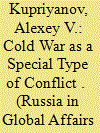

|
|
|
|
|
| Summary/Abstract |
Russian, Chinese, and Western scholars refer to the current confrontation
between the United States and China as Cold War 2.0. However, it remains
only a figure of speech used to emphasize the global nature of the conflict.
This article proposes to rationalize the analysis of the Cold War as a systemic
phenomenon requiring the development of a specific strategy and tactics.
This is a difficult task, since any Cold War suggests a long-time span, with no
possibility for crushing the enemy with a rapid offensive. By way of example,
this article outlines a possible naval strategy for Russia.
|
|
|
|
|
|
|
|
|
|
|
|
|
|
|
|
| 2 |
ID:
184559


|
|
|
| 3 |
ID:
184554


|
|
|
|
|
| Summary/Abstract |
In 2021, Russia’s foreign policy seems to have entered a new stage.
Let us call it the “constructive destruction” of the previous model of
relations with the West. Elements of this policy kept piling up for
some fifteen years, approximately since Vladimir Putin’s well-known
speech in Munich in 2007. But residual attempts to fit into the Western
system with a defensive approach still prevailed in politics and rhetoric.
Constructive destruction is not aggressive. Russia is not going
to attack or destabilize anyone.
|
|
|
|
|
|
|
|
|
|
|
|
|
|
|
|
| 4 |
ID:
184567


|
|
|
| 5 |
ID:
184562


|
|
|
|
|
| Summary/Abstract |
The thirty years of joint efforts to build an effective dialogue between
the Russian government and the Russian diaspora abroad have produced
controversial results. The Russian diaspora has remained one of the most
divided and disunited in the world. Its potential as a lobbyist and broker
has gradually shrunk to zero, while no system capable of protecting the
rights of compatriots has been built by Moscow to this day. Recent years
have seen still greater fragmentation and polarization of Russians living
abroad, triggered by the Kremlin’s foreign policy actions in 2014. There
has developed a confrontation between those who associate themselves
with their compatriots and the Russian world, on the one hand, and
Global Russians, on the other hand.
|
|
|
|
|
|
|
|
|
|
|
|
|
|
|
|
| 6 |
ID:
184555


|
|
|
|
|
| Summary/Abstract |
The article describes the crisis of modern international relations theory
(IRT) and assesses the prospects of political realism for developing a
nationally oriented theory in Russia. The authors believe that realism can
significantly contribute to the development of such a theory. However, the
developmental tasks facing Russia go beyond the scope of realism; Russia
must formulate a comprehensive idea of national development and IRT.
The national idea should not be confined to the country’s survival and
security; it should include the national understanding of freedom, values
and development resources. Realism is not the whole truth, and in some of
its manifestations it substitutes truth by power.
|
|
|
|
|
|
|
|
|
|
|
|
|
|
|
|
| 7 |
ID:
184550


|
|
|
|
|
| Summary/Abstract |
“A dangerous gap has emerged between the realities of the nuclear
age and the understanding of the challenges facing the world.
A fundamental revision and a decisive rejection of outdated
philosophies and obsolete doctrines is the primary and vital
necessity... New economic, scientific and technological factors
are forming an integral interdependent world, in which reality
imposes more stringent demands on the leaders of each state and
requires utmost responsibility in behavior and decision-making.”
|
|
|
|
|
|
|
|
|
|
|
|
|
|
|
|
| 8 |
ID:
184566


|
|
|
| 9 |
ID:
184552


|
|
|
|
|
| Summary/Abstract |
The collapse of any global empire always had a profound and lasting
impact on the entire world history, and the disintegration of the Soviet
Union was also the case. The Soviet Union was more than just a
country; it was an “empire” that united countries covering the Eurasian
continent, a military alliance and a large economic association, as well
as a worldwide ideology and a peculiar social system.
|
|
|
|
|
|
|
|
|
|
|
|
|
|
|
|
| 10 |
ID:
184561
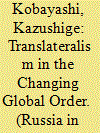

|
|
|
| 11 |
ID:
184564
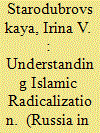

|
|
|
|
|
| Summary/Abstract |
This article addresses two main issues: 1) the research progress in
radicalization theory and its development trends; 2) the relevance of field
research of Islamic communities in the North Caucasus for the radicalization
theory. The author maintains that different conceptions of radicalization,
from simple to more complex and most comprehensive ones, have failed
to cope with the key problems inherent in this approach. One of the main
ways to enrich the radicalization theory is to expand its information basis,
including through field research. The results of field research conducted
in the North Caucasus by the author suggest the need to look closely at
the role of macro processes in understanding radicalization; at religious
radicalism as a “commodity” not only on the religious market, but also on
VOL. 20 • No.1 • JANUARY – MARCH • 2022 185
Irina V. Starodubrovskaya
the market of ideologies and youth cultures; and at competition among
different religious ideologies as a mechanism that can turn mutual relations
between the opponents and proponents of violent actions into a “two-way
street,” and not a “conveyor belt” or “firewall.
|
|
|
|
|
|
|
|
|
|
|
|
|
|
|
|
| 12 |
ID:
184558
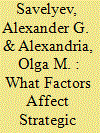

|
|
|
|
|
| Summary/Abstract |
The article analyzes the data obtained in a survey that involved twenty
leading Russian experts specializing in international security, arms control,and strategic stability. The survey was conducted in December 2021. The
respondents were asked to name factors that, in their opinion, currently have
(2022) or will have a tangible impact on strategic stability in the foreseeable
future (until 2036) and to list them in the order of their significance. In
addition, they were asked whether and how these factors would be taken
into account in the future. Two time frames were chosen for analysis: up
until the year 2026 (when the “extended” START-3 Treaty will end) and up
until the year 2036 (when a possible nuclear arms control agreement that
may replace START-3 will expire). The experts were also asked to assess the
degree to which the proposed factors may affect strategic stability in 2022,
2026, and 2036.
|
|
|
|
|
|
|
|
|
|
|
|
|
|
|
|
| 13 |
ID:
184553


|
|
|
|
|
| Summary/Abstract |
Russia’s military operation in Ukraine, illegal in terms of the pre-1990s
international law and probably a geopolitical miscalculation, has caused
a shock incomparable even with that of the 2003 American attack on Iraq
that was proudly baptised Operation Shock and Awe. Remarkably, neither
the twenty-year-long war in Afghanistan waged by the U.S. and its allies, nor
the destruction of Libya in 2011, nor the multiple military interventions in
Africa, nor even NATO’s bombardment of Serbia in 1999—the first unlawful
use of force in post-WWII Europe—have caused such anger. There is always
a whiff of racism in the fact that wars waged against people who have
chosen to be on the “wrong side of history” are not condemned by those
on “right side of history” as they must be. How did it happen that after the
fall of the Berlin Wall and reasonable expectations of a peaceful future, the
world found itself in a situation where the use of military force has become
nearly normal unless it is used against Europeans who chose the “right
side of history”? How and why, in the race towards “the end of history” the
|
|
|
|
|
|
|
|
|
|
|
|
|
|
|
|
| 14 |
ID:
184563
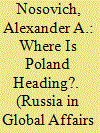

|
|
|
|
|
| Summary/Abstract |
The sociopolitical split in Polish society disorients Warsaw’s Eastern policy.
Poland has historically positioned itself as a missionary in Eastern Europe,
but the current internal conflict calls into question the very essence of
this mission. On the one hand, Warsaw clearly intends to facilitate the
integration of states in the western part of the post-Soviet space into the
Western structures. On the other hand, a significant part of Polish society,
whose views are represented by the country’s leadership, is unhappy about
the trends afoot in the United States and Western Europe and sees Poland
as a conservative alternative to the Western mainstream. For its part, the
liberal part of society is dissatisfied with this standoff and insists that
Poland should follow the main social trends of major Western countries. As
a result, Poland has found itself facing an identity crisis.
|
|
|
|
|
|
|
|
|
|
|
|
|
|
|
|
|
|
|
|
|